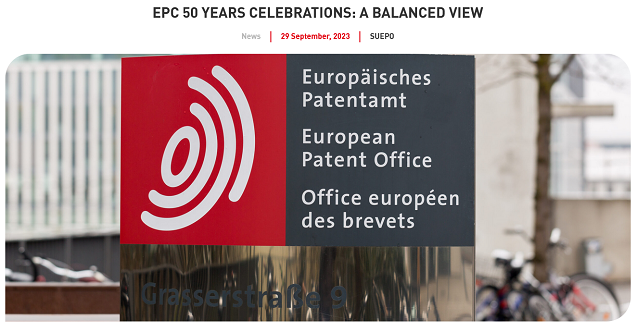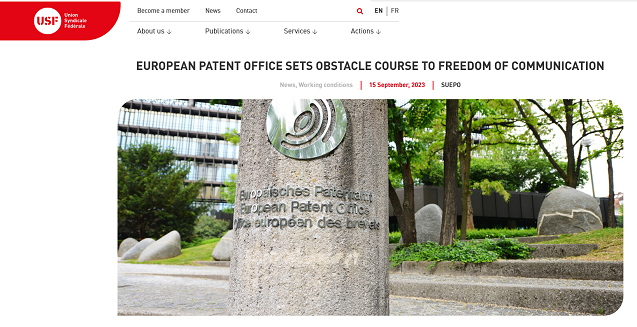Season's Greetings from SUEPO - Warm Wishes for the Festive Season and the New Year

Dear SUEPO Members,
As the year draws to a close, we would like to take this moment to thank you for your continued trust, solidarity and engagement throughout the past year. Your commitment to our shared values and collective interests remains the cornerstone of our strength as a Staff Union.
The festive season offers a welcome opportunity to pause, reflect and regain energy. We hope this time brings you moments of calm, warmth and connection with those close to you.
Looking ahead to the New Year, we remain committed to standing together with you, defending staff interests and working constructively to address the challenges and opportunities that lie ahead. United, we will continue to speak with a strong and credible voice on behalf of our members.
We wish you a peaceful festive season and a confident start into the New Year.
In solidarity and with our warmest wishes,
Your SUEPO TH committee – M18B10 and De Bruyn Kopsstraat 15, Unit 1.11, Rijswijk

The bargaining power of staff increases with every new SUEPO member – please consider joining SUEPO TH if you have not done so yet. And a warm thank you to all our members: you are the backbone of our union!
[USF] SUEPO The Hague - Affiliate of Union Syndicale Fédérale (USF)
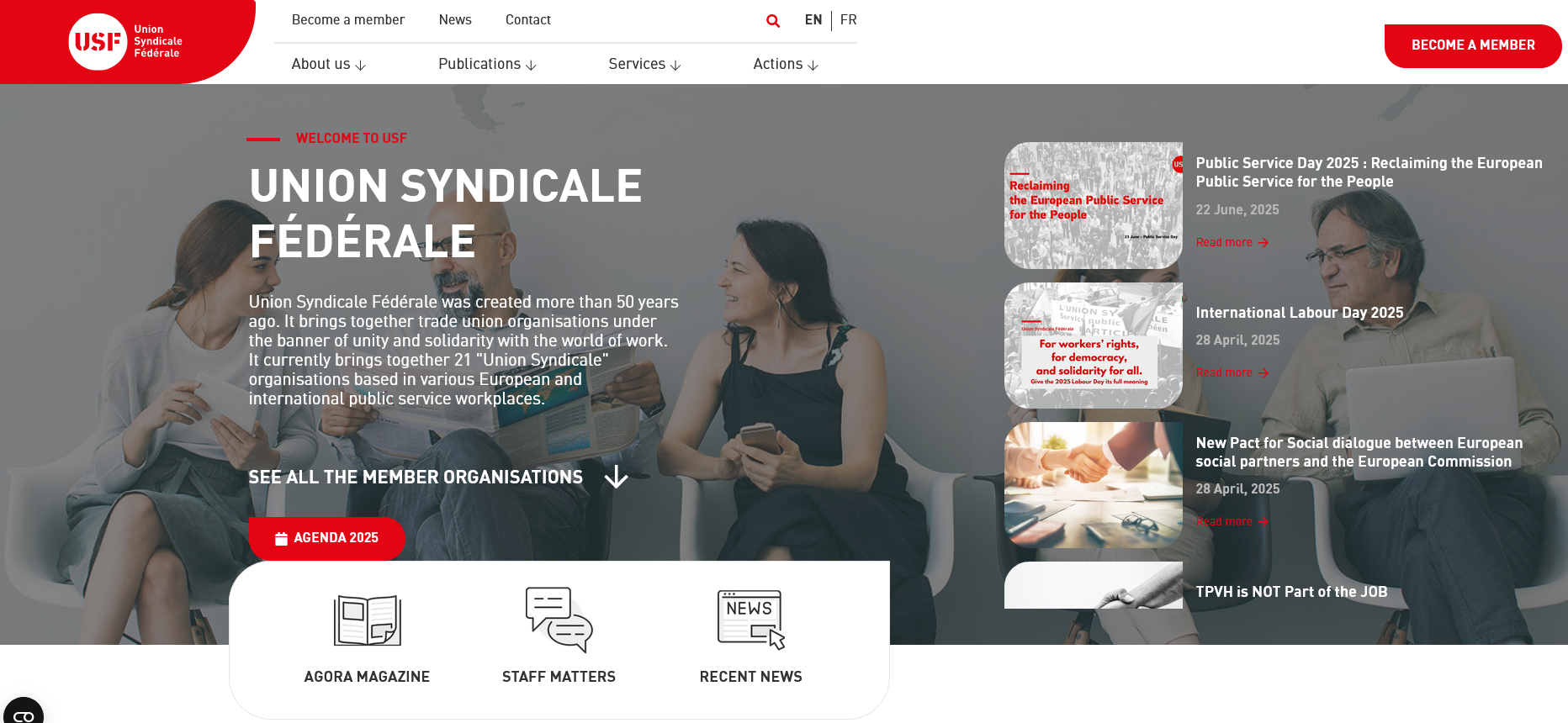
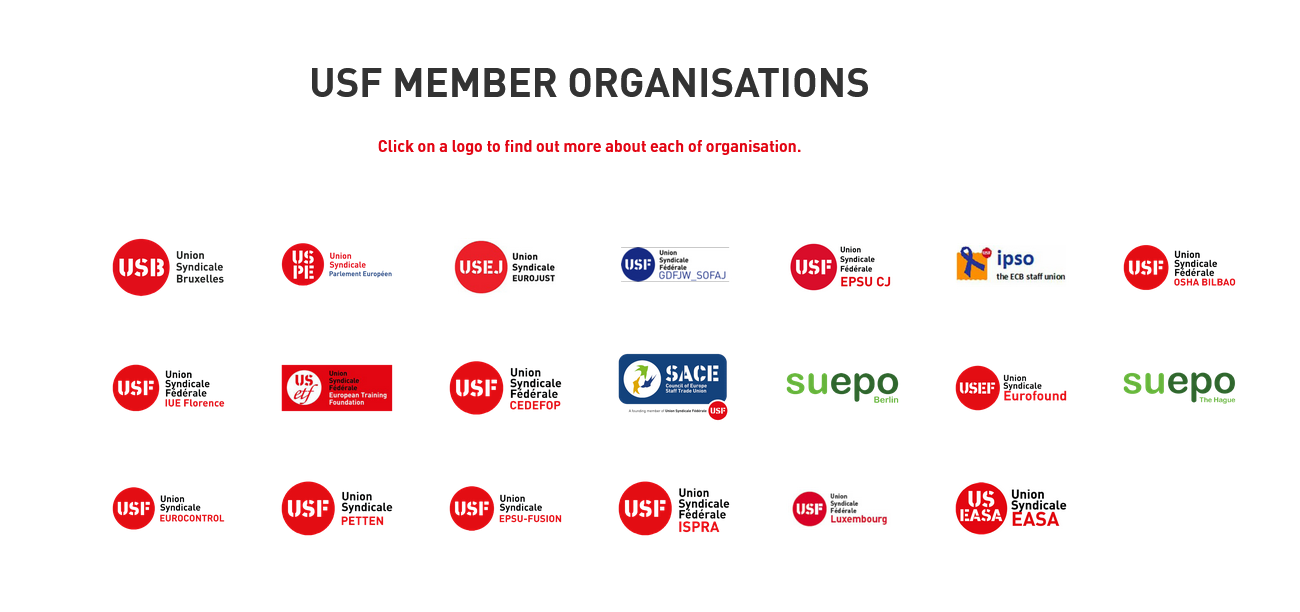
Click on the images
SUEPO The Hague is an affiliate of Union Syndicale Fédérale (USF), the umbrella organisation representing over twenty unions across European and international public service institutions. As part of the USF network, SUEPO The Hague stands in solidarity with thousands of public servants from diverse professional backgrounds, nationalities, and employment conditions. Together, we work to uphold the rights, welfare, and values of staff serving the public interest across Europe and beyond.
To learn more about USF’s union activities and to explore the latest editions of the renowned Agora magazine, we invite you to visit the USF website.
Season's Greetings from SUEPO

Dear SUEPO Members,
As we reflect on the past year, we are deeply grateful for your solidarity and unwavering commitment to our shared cause. Your support is the foundation of our collective strength and the progress we’ve achieved together in 2024.
This holiday season, we wish you moments of rest, joy, and connection with those who matter most. May this time renew your energy and inspire us all to continue standing united in 2025, ready to face new challenges and celebrate new successes together.
Thank you for being an essential part of our union. Together, we make a difference.
In solidarity and with warmest wishes,
Your SUEPO TH committee – M18B10 and De Bruyn Kopsstraat, 15, Rijswijk

Please consider joining SUEPO if you haven’t done so yet!
[EPSU] Collective bargaining news from the European Public Service Union
 News from Europe’s public service unions on negotiations, pay and conditions, union rights, strikes and protests
News from Europe’s public service unions on negotiations, pay and conditions, union rights, strikes and protests
The European Federation of Public Service Unions (EPSU) representing over 265 unions, advocates for the rights and interests of 8 million public service workers throughout Europe.
October 2023 No.21
-
Iceland: Unions and other organisations mobilised for women’s strike
-
Latvia: Pay dispute in health sector resolved
-
Croatia: Public sector negotiations deliver a 5% pay increase
-
Germany: Unions aim for 10.5% pay increase in regional government
-
Ireland: Union members vote on non-profit sector pay proposal
-
Europe: Report finds few examples of shorter working time
-
Finland: Unions plan actions in response to government plans
-
Spain: Ministry of justice proposal not enough to end dispute
-
Netherlands: Unions give ultimatum to youth sector employers
-
Sweden: Union negotiates two new agreement in non-profit sectors
-
Portugal: Unions call for higher pay increase for 2024
-
Austria: Latest on public sector and private health negotiations
 Iceland
Iceland
Unions and other organisations mobilised for women’s strike
On 24 October, the BSRB public sector federation was one of more than a dozen organisations supporting a day of action calling for urgent action to address gender inequality, the gender pay gap and to tackle gender-based and sexual violence. Actions ranged from strikes and demonstrations to the withdrawal of all forms of labour, paid and unpaid. Since the first women’s day of action in 1975, unions and other organisations in the country have organised major strikes and protests and there has been some reduction in gender inequality. However, there is still a long way to go with the gender pay gap at 21% and the theme of this year’s action is “Do you call this equality?”.
 Latvia
Latvia
Pay dispute in health sector resolved
The LVSADA health workers’ union reached an agreement with the Ministry of Health on 18 October that will deliver pay increases for doctors (10.6%), nurses (6.5%) and assistant nurses (6.9%) in 2024. This means that medical personnel will have seen pay rises of around 23-24% for the three-year period 2022-24. There will also be an additional €40 per month (gross, average) for non-medical personnel in 2024. The agreement was negotiated with the new health minister and resolves a long-standing dispute over pay.
 Croatia
Croatia
Public sector negotiations deliver a 5% pay increase
The HSSMS-MT healthcare union reports that following the third round of public sector pay negotiations, unions have accepted a pay increase of 5%, an improvement on the 3% offer made in the second round of bargaining. The unions have also secured the €300 Christmas bonus that they were looking for and an Easter bonus of €100, less than they wanted but a €30 improvement on the previous offer. There is also a commitment that, should the new pay system not be in place by 1 March 2024, then negotiations would open for a general pay increase.
 Germany
Germany
Unions aim for 10.5% pay increase in regional government
The ver.di trade union, leading negotiations covering 1.2 million workers in regional government, has set out the main claim for a 10.5% salary increase, but with a minimum increase of €500 a month. The demands also include an extra €200 for junior staff and trainees are to be taken on for an unlimited period. The unions want a 12-month agreement. Ver.di says employees have high expectations for the outcome of the negotiations and stresses that better pay and conditions are needed to help address the 300,000 staffing shortage across public services. An important aim will be to close the gap with salaries in federal and local government where there is a 10% difference on average, rising to several hundred euros for some occupations. Negotiations were due to begin on 26 October and the unions will expect that the outcome will be applied to over a million civil servants who are not directly covered by the collective agreement.
 Ireland
Ireland
Union members vote on non-profit sector pay proposal
Members of three trade unions – Fórsa, SIPTU and INMO – are voting on whether to accept a deal that might resolve a long-standing dispute over pay affecting non-profit health providers. The unions have been seeking to restore pay parity between workers in these bodies and directly employed public sector health and social care staff. Strike action was due to begin on 17 October but a revised offer from the employers lead the unions to suspend the action and consult members. Instead of the two-stage 5% increase offered in July, the employers have put forward a 3% increase backdated to 1 April 2023, a 2% increase from 1 November 2023 and a 3% increase from 1 March 2024, so more than 8% within less than 12 months. There is also a commitment to further negotiations starting by 1 December 2023 at the latest that will consider comparability with current and future public sector pay agreements. The government has acknowledged the importance of adequate financing of the non-profit sector in order to fund pay increases and tackle staff shortages.
 Europe
Europe
Report finds few examples of shorter working time
The latest review of working time developments by the Eurofound research agency notes increased debates around the issue of working time reduction but few examples of where this has been implemented in practice. It reports on a couple of examples of shorter working hours in the private and non-profit health and social care sectors in Austria and a municipal company in Portugal. The public sector agreement in Lithuania includes additional day’s leave for education and training while national legislation there now allows for a 32-hour/four-day week for state and municipal employees who have children under the age of three. The report found that while the usual working week for full-time employees stood at 39.8 hours in 2022, the average collectively agreed normal full-time working week in the EU was 38.1 hours. In a comparison of sectors it also revealed the collectively agreed normal working week was shortest in public administration (37.7 hours) and longest in retail (38.5 hours).
 Finland
Finland
Unions plan actions in response to government plans
Trade unions and their confederations continue to raise concerns about the government’s proposals that will impact trade union rights, employment conditions and the welfare state. Members of the SAK confederation has been involved in a series of events, protests and work stoppages since September and more are planned for November. The STTK confederation is mobilising for a major demonstration on 18 November while the AKAVA confederation is focused on getting the government around the negotiating table.
 Spain
Spain
Ministry of justice proposal not enough to end dispute
The FSC-CCOO federation reports that the ministries of justice and finance have promised a pay rise to all workers in the justice ministry on the basis that Pedro Sanchez is re-installed as the head of a new coalition government. However, the union says that the commitment is not enough to end the long-running dispute that has already involved two months of strike action. The FSC-CCOO has written to the ministry to demand immediate negotiations over a pay rise for all workers irrespective of who runs the government. Union demands also include action on career development, an end to pay differentiation within the ministry, improved promotion processes and pay additions for workers who do extra hours to clear the backlog created by the dispute.
 Netherlands
Netherlands
Unions give ultimatum to youth sector employers
The FNV and other trade unions have set a deadline of 1 November for employers in the youth sector to come up with an improved pay offer or they will aim for a major mobilisation on 20 November. This would be the 10thtime in recent years that unions have had to take to the streets to push their demands. The unions argue that the employers’ “final offer” would only lead to more workers leaving the sector and further increases to staff shortages. The biggest stumbling block during the negotiations was inflation compensation for 2023. Following just a 1% pay increase on 3 January, the unions are looking for pay increases in 2024 and 2025 to compensate for inflation. They are aiming for a 10% wage increase by 2024, including the inflation adjustment for 2023, but the employers do not want to go beyond 6.7%. For 2025, employers have offered 3.5%, plus the introduction of automatic price compensation with a maximum of 2% from April to December. However, the unions are demanding an extra 5% and are prepared to discuss automatic price compensation with a maximum of 2%, provided that there is also an agreement on reducing workload.
 Sweden
Sweden
Union negotiates two new agreement in non-profit sectors
The Kommunal trade union has negotiated two two-year collective agreements with the Fremia employers’ organisation that covers non-profit service providers. In the agreement with Fremia covering personal assistance, wage increases will be negotiated around an amount of at least SEK 993 (€84) from 1 October 2023 and at least SEK 875 (€74) from 1 October 2024. Minimum wage rates will be increased by SEK 1,350 (€115) from 1 January 2024 and by SEK 875 (€74) from 1 January 2025 while all allowances and supplements will be increased by 4.1% and 3.3% on the same dates. In the civil society agreement, from 1 October 2023 there will be a pot of SEK 1,059 (€90) for wage increases for each full-time employee and then SEK 981 (€83) from 1 October 2024 when there will also be a special low-wage initiative, providing an extra SEK 71 (€6). Minimum wages in the agreement for employees aged 19 and over will be SEK 21,729 (€1847) as of 1 October 2023 and SEK 22,446 (€1908) as of 1 October 2024.The new minimum salary for employees who have, among other things, vocational upper secondary education will be SEK 24,312 (€2067) as of 1 October 2023 and SEK 25,114 (€2135) as of 1 October 2024.
 Portugal
Portugal
Unions call for higher pay increase for 2024
Both the SINTAP and STAL unions have expressed discontent with the pay increase on offer for public service workers in 2024. The overall wage bill will rise by over 5% with increases ranging from 3% to over 6% depending on position in the pay scale. The two unions argue that this level of increase will not compensate for the recent loss of purchasing power because of higher inflation. STAL estimates a 5.1% fall in real terms in 2022-23 alone. SINTAP has called for a re-opening of negotiations while STAL has called a national strike for 27 October. The strike, also supported by the Frente Comum group of unions has a wide range of demands covering career development, overtime rates, annual leave, working time and more.
 Austria
Austria
Latest on public sector and private health negotiations
The first round of bargaining for a 2024 pay increase for public sector workers took place on 20 October and as usual the basic aim was to agree the key figures on which the negotiations would be based. These were established as 9.15% for inflation (year to September 2023) and forecasts of a 0.4%-0.8% decline in economic output. The negotiations involve the public sector unions younion and GÖD. Meanwhile, the first round of bargaining in private health and social care was disappointing for the vida and GPA trade unions as the employer offer of an 8.8% increase was well below the unions’ claim for a 15% increase. The second round of negotiations will take place on 15 November and the unions are already planning a major conference of staff councils on 20 November in the expectation that the negotiations don’t produce a result and so to discuss potential mobilisation.
[USF] Invitation to Union Syndicale Well-being Workshop with Andy Whittle Wednesday, 25 October 2023, from 12h30 to 14h00

USF, the umbrella union of SUEPO, is regularly organizing "wellbeing workshops".
Here are the details of the next one "How to believe in yourself and gain more confidence in the face of adversity".
When: Wednesday, 25 October 2023, from 12h30 to 14h00
Where: Zoom Meeting
How much: free and open to all
Don’t forget to RSVP by Tuesday 24 October 2023, at 12h00 noon
The workshop is to be conducted in English and it will not be registered.
To register, click here.
Have a great day and a good start to the week.
PS: due to time constraints we have been unable to organize an in person event in the new SUEPO headquarters, but will do our best to do so next time around
[USF] Union Syndicale Fédérale letter to Ministers of all EPC Member States responsible for the European Patent Organisation
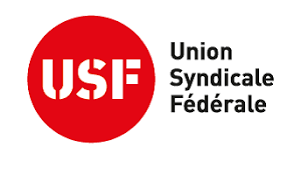
We hereby inform you of a letter from the Union Syndicale Fédérale (USF), addressed to the Ministers of all European Patent Convention (EPC) member states responsible for the European Patent Organisation (EPO). This letter serves as a powerful call to convene the long overdue Conference of Ministers of the Contracting States under Article 4a of the European Patent Convention (EPC).
The USF, a respected federation of trade unions in the European public service sector, is taking a proactive stance in advocating for transparency, accountability, good governance and fairness within the EPO. The Conference of Ministers of Contracting States under Article 4a EPC is a vital mechanism for addressing the pressing issues that have been raised within the EPO, and the USF's letter underscores the urgency of convening this conference.
We encourage you to reading the letter.
In solidarity,
SUEPO Central
[USF] Invitation to Union Syndicale Well-being Workshop with Andy Whittle on 27 September 2023, 12:30 - 14:00
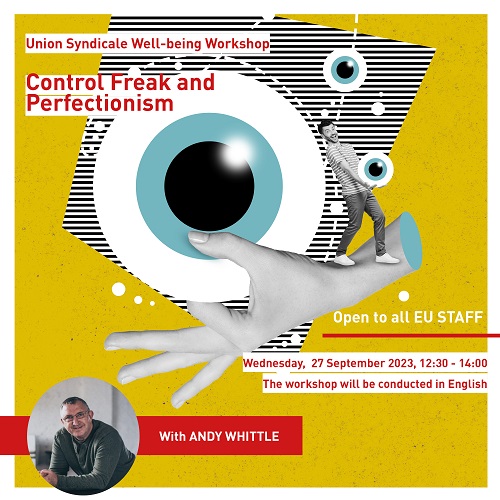
Dear Members, dear Colleagues,
We are back! Fresh from summer break we are ready to start a new cycle of workshops to maintain our mental health. We are starting with a heavy topic but worth a discussion. This September we are going to talk about :
"Break Free from Control Freakism and Perfectionism"
Are you a perfectionist or a control freak?
Do you find yourself always wanting to control everything and not being able to let go?
If any of these signs apply to you, you might be a control freak or perfectionist:
1. You refuse to delegate
2. Everything must be to your schedule or timeline
3. Your expectations might at times feel threatened
4. You micromanage others (at work and at home)
5. You think there’s only one right way to do something.
6. You have trouble trusting people
Striving for perfection is nothing less than exhausting, but letting go is hard to do.
Andy will help you manage your anxiety with some tips he has found helpful as a recovering Overthinker-Control-Freak-Perfectionist.
You will come away with:
* Awareness and Self-Reflection: Participants will have a better understanding of their control freak and perfectionist tendencies.
* Being able to embrace imperfection: Encouraging a mindset shift towards accepting imperfections and mistakes as opportunities for growth and learning.
* Better Time Management skills: Strategies to prioritize tasks and delegate when necessary, reducing the need to control every aspect of a situation.
* Better Boundaries: Learning to set healthy boundaries in personal and professional relationships to prevent overextending oneself.
NOTE: Don’t forget to have a notebook and a pen so you can note down important things during the session.
When: Wednesday, 27 September 2023, from 12h30 to 14h00
Where: Zoom Meeting Room
How much: FREE and OPEN to all EU staff, members and non-members of Union Syndicale.
Don’t forget to RSVP by Tuesday 26 September 2023, at 12h00 noon
The workshop is to be conducted in English and it will not be registered.
Please register here
For more info, click here !

